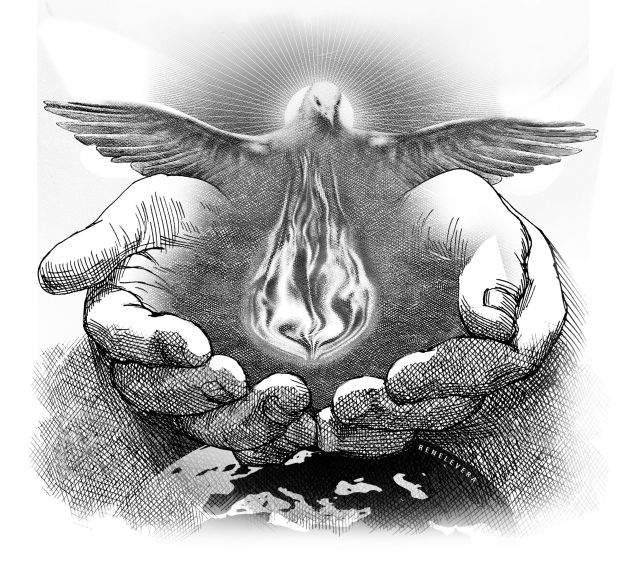
At about the time of the Second World War, T.S. Eliot wrote “Four Quartets,” a set of four poems, a meditation on how humanity finds itself at the crossroads of time and eternity, and the choice it must make to avoid destruction. Eliot planned to yoke the four poems to the four elements: hence, “Burnt Norton” to air, “East Coker” to earth, “Dry Salvages” to water and “Little Gidding” to fire.
The last poem to be written, “Little Gidding,” alludes to a small village in England which once had a religious community. “Midwinter spring is its season / Sempiternal though sodden towards sundown, / Suspended in time, between pole and tropic,” the poem begins. It goes on to describe a winter afternoon with its cold brightness and blossoms of snow. At Little Gidding, the poem adds, one communes with the Divine. There one should “put off / Sense and notion,” having come, not to learn or instruct oneself but to pray: “You are here to kneel / Where prayer has been valid.”
Next comes an account of the death of the four elements — air, earth, water and fire — and of the poet walking at dawn and meeting a spirit, the common ghost of poets he considers his masters, who expounds on the need to limit the discourse to the present (“For last year’s words belong to last year’s language / And next year’s words await another voice”), offering his thoughts on the transience of human enjoyment, the futility of impatience with human folly and the pain of reliving the past and recalling the hurts that one had caused others no matter if well-intentioned — “the shame / Of things ill done and done to others’ harm / Which once you took for exercise of virtue.”
The poem alludes to the sameness of attachment, detachment and indifference, and how memory brings about indifference and therefore liberation, “not less of love but expanding / Of love beyond desire, and so liberation / From the future as well as the past.”
Despite all this, the poem asserts that “all shall be well,” quoting the mystic Julian of Norwich, who held that God can draw a greater good even from evil.
And all shall be well and
All manner of thing shall be well
By the purification of the motive
In the ground of our beseeching.
The dove descending breaks the air
With frame of incandescent terror
Of which the tongues declare
The one discharge from sin and error.
The only hope, or else despair
Lies in the choice of pyre or pyre—
To be redeemed from fire by fire.
By “fire,” Eliot means the fire that symbolized the destructive events of human history — exemplified by the fire in the London Blitz, the bombing raids carried out over Britain by the Germans during the Second World War — as well as the fire of the Holy Spirit, the tongues of flames that descended on the apostles and the Virgin Mary at Pentecost. He likewise identifies fire with love, which completely engulfs and consumes the lover, just as the mythical shirt of Nessus burned the one who wo r e it.
We only live, only suspire
Consumed by either fire or fire.
I remember a similar reference to fire made by Jesus in the Gospel of Luke — “I have come to set the earth on fire, and how I wish it were already blazing! There is a baptism with which I must be baptized, and how great is my anguish until it is accomplished!”
What is this fire? Jesus’ message, which set the world ablaze and infuriated the politically correct Establishment of his time, and earned for Jesus adversity and tribulation resulting in his death, this was the fire that Jesus meant, a baptism in his own blood. And this his followers must prepare themselves for as they continue Jesus’ preaching with their lives and words, the spreading of which throughout the world being a matter of the Lord’s concern.
When that day comes, when the world finally accepts the message and the person of Christ, the rose of God’s infinite mercy will unite with the purifying fire of the Holy Spirit, and all, all of humanity and creation, will be well —
And all shall be well and
All manner of thing shall be well
When the tongues of flames are in-folded
Into the crowned knot of fire
And the fire and the rose are one.
Disclaimer: The comments uploaded on this site do not necessarily represent or reflect the views of management and owner of Cebudailynews. We reserve the right to exclude comments that we deem to be inconsistent with our editorial standards.
